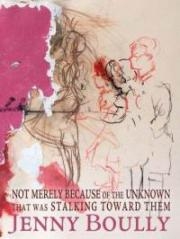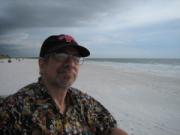
not merely because of the unknown that was stalking toward them
by Jenny Boully
Tarpaulin Sky Press
Part story, part poem, part analysis, Jenny Boully’s fourth book resists categorization within any of the common genres. Composed of various excursions into Peter Pan, it extends J. M. Barrie’s characters and comments on the whole enterprise, expanding the story—not radically, but enough to pique our interest. Its diction and language are those of poetry in both style and structure, and as the story has the characters grow up, it becomes more poetic. “He will come to you to teach you how to fly so that you may visit that dark other space there between two stars,” we are told near the beginning, “he” being Peter of course. The explorations are led by Wendy and Peter as they try to collect and understand their world, presided over by the Darlings, whose presence is only occasional and tangential. Captain Hook, Smee, and their pirate ship also appear, as do the lost boys, all in search of ways to behave in the story’s Neverland. But what we’re given mainly is the imagined story of the children, commented on in a separate section on each page as it proceeds.
“We won’t notice we’ve grown until we’ve grown” is an early comment, rising above the story to explain its context. At the same time, there aren’t any conclusions about meaning, only various comments about the characters’ circumstances. Somehow these disjointed comments constitute ongoing narratives.
The story develops beyond the original as the children grow and take on aspects they do not have in Barrie’s Peter and Wendy or Peter Pan in Kensington Gardens, thus taking up advice Peter gives Wendy toward the beginning of Boully’s book: “Don’t write down what actually happened; instead write down what you wanted to believe.” And what is written is a gradual enlargement of the story. Boully incorporates lines from Barrie’s books into this soup of language, moving easily back and forth through time. In this fluid mix of past, present, and future, Wendy assumes the role of mother, of wife, and Peter is called, variously, a bird, a grave digger, a grown-up. At one point we’re told that Peter even “works in an office and wears a tie too.”
None of these life-changing developments are discussed or become substantial. The developments don’t constitute any real drama, and though what we’re left with has a sort of plot, the “story” is subsumed by the poetry of the language itself, which is what keeps us reading. At the same time, the self-conscious narrator gives us elements explaining stylistic decisions of the poems. In the end, a couple of new characters appear briefly, but all of them wind down toward a sort of entropy. In other words, nothing much happens; only the story lives, as if placed in a small box and sealed up, which we are told toward the end. Thus, the whole thing, which could be called a prose poem, actually becomes a sort of metafiction—a story about the process of storytelling.


